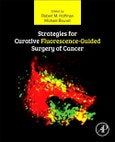Strategies for Curative Fluorescence-Guided Surgery of Cancer is the first book to discuss how fluorescence-guided surgery can be successfully used during surgeries with several tumor types. FGS is one of the most exciting emerging modalities of surgery, especially cancer surgery, as it potentially allows the surgeon to visualize the actual margin of the tumor, thus greatly increasing the possibility of curative resection. The book discusses the applicability of FGS for several types of cancer, such as pancreatic cancer, liver metastasis, soft-tissue sarcoma, glioma, melanoma, and breast and lung cancer.
This book is a valuable resource for cancer surgeons, cancer researchers and members of several other areas in the biomedical field who are interested in understanding this powerful technique.
Please Note: This is an On Demand product, delivery may take up to 11 working days after payment has been received.
Table of Contents
1. Cancer surgery: the major problems and impediments for cure2. FGS: the major principles3. Principles of antibody labelling of tumors for FGS4. Principles of labelling of tumors with genetic reporters for FGS5. Principles of curative FGS of cancer6. Principles of curative FGS of pancreatic cancer7. Principles of curative FGS of liver metastasis8. Principles of curative FGS of soft-tissue sarcoma9. Principles of curative FGS of glioma10. Principles of curative FGS of melanoma11. Principles of curative FGS of triple-negative breast cancer12. Principles of curative FGS of lung cancer13. Color-coded labeling of cancer and stroma for curative FGS14. Future of curative FGS15. Instrumentation for FGS








